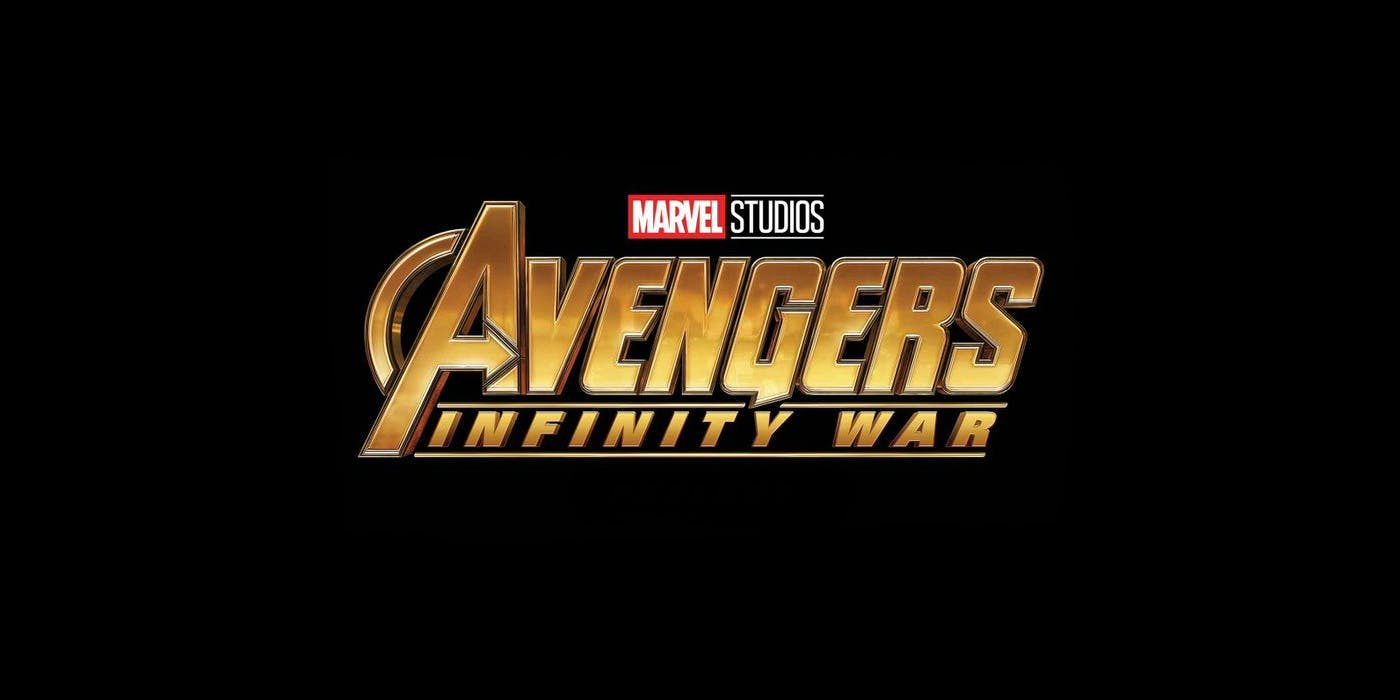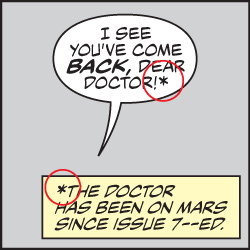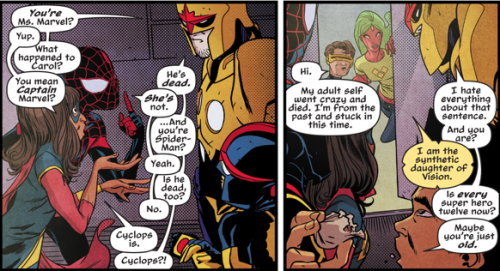
Warning, spoilers below if you haven’t watched it yet
Infinity War felt less like a movie and more like an event. The Marvel 10 logo at the beginning sent me back to 2008, when Agent Coulson offered Tony Stark his SHIELD emblazoned business card. The car ride home my dad, who always took me to his weekly comic book pickups and picked an extra issue for me, shared in my teenage glee as we speculated on what superheroes we’d see on the big screen. Fast forward to Infinity War, where my eyes began watering as Okoye braced herself for battle with the words “It will be an honorable end.” From high school through college to today, these Marvel movies have been mile markers in my life, if just for the consistency of their releases alone. Infinity War finally cashes in on the momentum the MCU has slowly been building for a decade: creating a bombastic superhero story on the big screen with strongest and weakest tropes comic books have to offer.
The best example of this is Thanos’ depiction in this movie. He’s easily my 2nd favorite villain in the MCU, only behind Erik Killmonger. Both are villains that I find have a pretty solid reason for what they’re doing. Thanos addresses a very real problem: an exponentially expanding population in a universe with limited resources. We’ve seen this fear realized in countless movies where aliens try to wipe out humanity for our resources, or where we end up turning on each other Freedom Wars-style. In addition to his reasonable motivation, Thanos’ interpretation by Josh Brolin is perfectly imposing, cunning, and sometimes sentimental. Thanos isn’t just twirling his mustache, but he’s a fully fleshed-out character that genuinely believes that he is trying to save the universe from itself.
— missoso ☀ saw iw x2 and now is sad x2 (@ynfinitiwar) April 26, 2018
But his conviction is undercut by a lack of imagination. Once the credits started rolling, one of my friends turned and said “if he’s all powerful with the gauntlet, why didn’t he just make more food?” It’s a bit of a stretch that a being so cunning given unlimited power couldn’t think of a better way to solve his problem, but if Thanos did suddenly save the world, he would cease to be the villain. Part of this weirdness comes from Disney’s development cycle. When Thanos appeared in Avengers 1, they kept his comic book motivation where he’s trying to impress the literal feminine incarnation of Death. The directors, considering that they’d have to spend time explaining the importance of Death in a movie already packed with 20+ characters, scraped the idea in favor of something more realistic. If they had added a part to the flashback where the leaders of Titan tried increasing resources, or some sort of explanation that the Gauntlet couldn’t alter the law of conservation of mass. It’s a large blindspot in an otherwise great villain.
#InfinityWar in one picture pic.twitter.com/YxgdGVD9hO
— แฮซพกกล้วย | iw spoilers (@SorryzZ) April 30, 2018
I do like that Thanos’ hubris means that he can still be defeated even with the ability to control reality and time, as shown with the battle on Titan. In true comic book fashion, it would have been too convenient if the plan went perfectly and the Star Lord/Stark/Strange crew defeated Thanos before he finished the Gauntlet. If anything, I would have been disappointed if Star Lord didn’t somehow screw the plan up. Both the comedic and dramatic core of the Guardians of the Galaxy movies has been Peter Quill’s childishness. His pain over the loss of important women in his life, first his mother and then Gamora, is a struggle that is central to his character. For him to suddenly show maturity and restraint there would have been out of character for plot convenience. If anything, Gamora was the vehicle for him to begin to develop as a person. It would have been to see if he was able to grow and mature without her, but instead he ended up being one of the characters dusted.
Even with the sheer amount of character deaths in this movie, Gamora’s was the one I found to be most tragic. She got a surprising amount of backstory in this movie where she barely featured in the first trailer. I think she’s the most tragic due to the environment where she died. Almost every other character with a death scene longer than 5 seconds got to be with someone they cared about, who either comforted them in their last moments or confessed their undying love. Gamora instead got the realization that she was the key to Thanos’ increasing power, and unwittingly handed it over to him by accompanying him. On top of that, Thanos confesses that the truly loved her like a daughter the whole time, adding insult to the years of abuse she endured from him. As she falls, she doesn’t get any flashes of Quill or the moments of happiness she had in the Guardians of the Galaxy movies. Instead we’re just left with her looking stunned as she realizes that her mere existence furthers Thanos’ goals. Gamora and maybe the Vision are the only ones who have time to realize a universe without the hope of defeating Thanos before they die.
Ironically, the scene where Gamora leads Thanos to the Soul Stone also made me grin with the reappearance of Red Skull. I’m not at all a fan of Red Skull, but his sudden reappearance was something delightfully comic book-y. Only in a superhero story would you have a villain who died in a movie 7 years ago return as a magic space ghost because he accidentally touched one of the story arc’s MacGuffins. In moments like this one, or when characters referenced events from other movies, I could feel a little editor’s note in a yellow box pop up in the corner: “*See: Captain America Movie #1”.

Gamora wasn’t the only character that surprised me with the amount of attention and development given. There was also Thor’s story arc, which managed to come to a full resolution in an ensemble movie. Throughout the MCU, Thor has been a one-note character, filled with hearty laughter and flowery prose as he tried to figure out what magic powered a cell phone. His first two movies weren’t much to write home about, but Thor: Ragnarok immediately turned that around. Ragnarok is easily in my top 3 favorite Marvel movies. It played with his goofy charm, but also explored the troubled dynamics in his family. Infinity War built upon that, with Thor grappling with the loss of his brother and his people. Pairing someone so goofy with the hyper cynical Rocket Raccoon was genius, as Rocket is a foil that cuts through Thor’s jolly bravado. They have the most compelling interaction in the movie with Thor’s monologue about how his loss makes his quest for vengeance clearer, and totally not at all clouded by grief and anguish. For a blockbuster action movie, it’s a surprisingly quiet moment that reveals the character behind the caricature. This look into Thor’s emotional state makes his return to the battlefield all the more triumphant. After the loss of his hammer, his crisis of identity, and the destruction of his people, it is awesome to see Thor return with his full power. His touchdown was the only moment in the movie where the audience at my showing cheered and clapped.
Thor and Rocket’s interaction stands in direct contrast with the most underutilized dynamic in the movie: Cap and Bucky. Cap is a flagship character for the Marvel movies with Bucky being a central point of conflict for him. Bucky’s “death” in the first Captain America movie devastated Steve. His role in Winter Solider and Civil War cemented how important it was for Steve to protect and redeem not only his best friend, but his only remaining connection to his past. But none of this build up is present anywhere in Infinity War. They are briefly reunited before facing off against Thanos’ army. Even then, you don’t see Cap and Bucky give an alien a sick Civil War-style beatdown. I had thought, with Chris Evan’s contract ending, Cap would die and leave Bucky to take up the mantle. This would allow Captain to make the ultimate sacrifice for his friend and give Bucky the opportunity to begin atoning for his past. Instead Bucky fades to dust, having said maybe 4 lines of dialogue to Cap in the entire 3.5 hour long movie. It’s a baffling waste of potential for a movie about capitalizing on these built-up storylines.
The other flagship character I expected to die was Iron Man. Officially, his movie kicked off the entire cinematic universe. Stark is the character we’ve spent the most time with, and is one of the most popular characters in the series. When Thanos stabbed him, almost everyone in the theater gasped before going dead silent. It was an incredibly impactful moment in a movie whose atmosphere has been getting heavier as it plods forward. When he was immediately healed, it felt like a cop out, especially in a movie where most other characters didn’t have that luxury. Since Age of Ultron, so much of Tony’s character has been his paranoia surrounding the oncoming Infinity War. His death there would have been a conclusion to the B-plot of Phase 2, with his actions coming full circle in a self-fulfilling prophecy. It would have also cemented the end of the MCU as we know it, by ending the character who started it all. Instead, Tony is spared while half the rest of the cast fades away with the snap of Thanos’ fingers.

But this is a comic book event, and meta-knowledge of how comic books or Disney’s production schedule works won’t let me take all of the deaths seriously. Knowing that this was Part 1 of a major event, I fully expected characters to die and for the villain to win. That’s not to say that some of the deaths didn’t hurt. I nearly shouted in the theater when Black Panther faded away, feeling like he was taken away from me after 2 short months. When it came time for Spiderman, my personal favorite, Tom Holland’s horrifying performance made me bawl my eyes out. But all those tears dried once the credits rolled and I remembered the Spiderman and Black Panther sequels slated for 2021. If these deaths had happened in a non-event movie, I would be devastated. For example, Yondu had a wonderful send off in Guardians 2 and there’s no expectation of him coming back. But it’s hard for the stakes in big comic events like this to have any impact, where swaths of characters get traumatized and annihilated so the writers can pick and choose which characters miraculously survive and in what configuration. I’m sure Cap, Iron Man, and Doctor Strange will find a way to rematerialize T’Challa and Peter Parker in time for Phase 4 of the franchise. I’m more curious to see how they’ll do it without magical/cosmic characters like Scarlet Witch, Vision, or the Guardians, and who they’ll manage to bring back. They’ll probably un-dust everyone, but will they be able to reverse Gamora’s sacrifice to the Soul Stone, or revive Loki? I’ll have to report back in next year’s blog post.
Overall, Infinity War does not feel greater than the sum of its parts, but the fact that it managed to cobble together the parts at all is an achievement in itself. It’s a testament to translating disjointed universe that comic books can form and experimenting with what cinematic storytelling can be. It’s not my favorite Marvel movie, and it barely feels like one. Its tone is darker, with its bleak ending, and grandiose, imposing wide-spaced serif fonts instead of their usual sleek, condensed sans-serif block lettering. Instead it feels like an event both in the series and in my life, making good on the promises of superheroes galore I imagined as I bounced in excitement on my way back from the movies 10 years ago.


